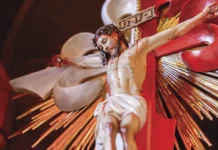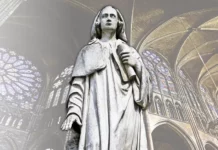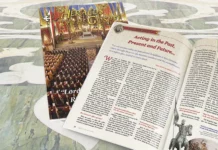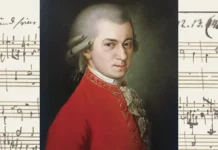Small episodes in the life of Don Bosco describe how he made use of cuffs and slaps to drive the malevolent spirit from his students. And they received these blows with great joy and fervour.
It was a normal day in the Oratory of Turin, around the year 1864. As usual, a few dozen students pressed around Don Bosco, avid to spend their half hour of recreation time in the company of the holy priest whom they loved and venerated as a father.
Always in high spirits, and eager to transmit the joy of virtue to his birichini, Don Bosco never let any of his young conversers escape his eye. One day, catching sight of a boy whose mind seemed to have wandered off into dreamland, he gave him a hearty slap.
Immediately, the Saint eased the boy’s perplexity with a broad smile and whispered to him: “Don’t worry. It was not you I struck, but the devil.” 1
Remedy against temptation and melancholy
Episodes like this were common in the daily life of the Oratory.
Fr. Lemoyne narrates that, “Don Bosco, noticing a boy with a melancholy air, called him over and asked the reason for his sadness, cautioning him: ‘St. Philip Neri taught that melancholy is the eighth capital vice.’ He consoled the boy with comforting words and finished off by giving him a sort of whack, saying: ‘Cheer up!’ And with that, wonder of wonders, his former joy was restored.” 2
Don Bosco would base himself on the authority of this same Saint on other occasions, to explain the reason for the light slap he had dealt one of the boys: “St. Philip Neri did this with his youth, to whom he would say: ‘I am not hitting you, but the devil who tempts you.’” 3
What did the boys of the Oratory think of these taps, cuffs and slaps?
Cardinal Giovanni Cagliero, who had not yet reached 13 years of age when he met his founder, gives this interesting testimony: “We were convinced that Don Bosco knew that the student he slapped had some temptation in his head.” 4 And Fr. Lemoyne, disciple and biographer of Don Bosco, adds: “In addition to this, the students were utterly convinced that the slaps of Don Bosco had the power to strengthen them in the fight against the devil.” 5
More slaps, please…
Accordingly, it was the most normal thing for one of them to ask Don Bosco for a slap, which he would give while saying in a light-hearted tone: “With this one, the devil will not bother you any more today.” The recipient assured him that he would not be perturbed by the devil for another six months.
Every day, one or another lad beset by some inner disturbance could be seen seeking him out and, without saying anything, presenting his cheek in expectation of a slap. After receiving it, he would run off happily like one who had just received a great favour.
And it is not only youngsters who appreciated this singular way of driving away the devil. Let us consider the letter from a Salesian cleric, reproduced by Fr. Lemoyne: “My beloved father […]. The most recent slap that you bestowed upon me remains imprinted on my face. When I think of it I blush to believe myself fit to bear on my face the mark of your loving fingers. Please send me more good slaps; I await them. I love Don Bosco more than the whole world. […] And if some sadness or evil thought assails me during the day, I need only to recall my dear Fr. John to be immediately liberated of it. Beloved Don Bosco, prostrated before you, I offer you everything that you could demand of me; I give you everything. Accept me as the least of your servants and do not exclude from the great book of your sons this one, in Jesus Christ, Giuseppe Pittaluga.” 6

Who actually received these blows?
Don Bosco had the gift of discernment of spirits in a high degree, by means of which he saw his students’ state of soul. He knew their temptations and their sins, to the point that he often reminded a penitent of some fault forgotten in Confession. He was also capable of observing the temptations and evil actions of boys who were entirely outside of his field of vision.
In 1863, he was away preaching the Spiritual Exercises in another house of the Congregation, when he saw two boys secretly leave the Oratory to bathe in a nearby river. After swimming for a while, they sat on the river bank and engaged in a conversation on improper subjects. Don Bosco heard them and interrupted them with a series of vigorous slaps on the back. They were startled because they could not see the “aggressor,” but they felt a burning pain across their shoulders, and so hastily returned to the Oratory.
The next morning, the director, Fr. Alasonatti, received a note from Don Bosco, relating that he had seen the two transgressors and given them a good lesson. The director called them, and they acknowledged their fault. Their shoulders were still smarting due to the strength of the slaps they had received.
On another occasion, Don Bosco asked one of the youths gathered around him:
— Do you remember having received one day a blow from an invisible hand?
Very surprised, the boy responded affirmatively and asked how Don Bosco knew of the fact. The latter merely asked another question:
— And what were you doing at that moment?
Seeing the boy’s face turn bright red, he took him aside and reassured him, whispering in his ear some words of admonition and encouragement. 7
* * *
Episodes like these make it clear how freely Don Bosco used his gift for curtailing the action of the evil spirit over the birichini of the Oratory by means of cuffs and slaps, and how his young students received these blows as precious favours. The infernal spirits, on the contrary, detested them. This is the best proof they were actually the only ones hurt. ◊
Notes
1 LEMOYNE, SDB, Giovanni Battista. Memorie biografiche di Don Giovanni Bosco. San Benigno Canavese: Libreria Salesiana, 1909, v.VII, p.554.
2 LEMOYNE, SDB, Giovanni Battista. Memorie biografiche di Don Giovanni Bosco. San Benigno Canavese: Libreria Salesiana, 1907, v.VI, p.424-425.
3 Idem, p.425.
4 Idem, ibidem.
5 Idem, ibidem.
6 Idem, p.427-428.
7 Cf. LEMOYNE, op. cit., v.VII, p.487-488.







